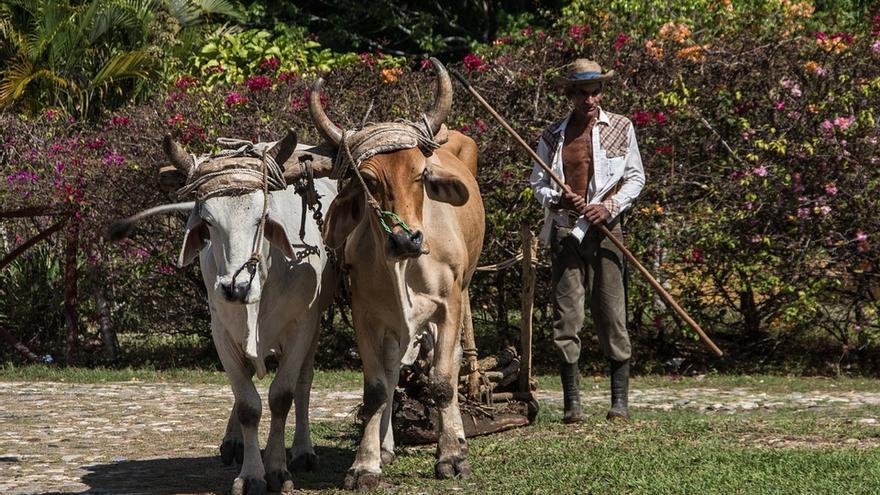
![]() 14ymedio, Havana, August 13, 2020 — “We’re approaching a famine that can be avoided,” begins the letter that the League of Independent Cuban Farmers and the Latin American Federation of Rural Women (Flamur) delivered to the UN High Commissioner of Human Rights, Michelle Bachelet.
14ymedio, Havana, August 13, 2020 — “We’re approaching a famine that can be avoided,” begins the letter that the League of Independent Cuban Farmers and the Latin American Federation of Rural Women (Flamur) delivered to the UN High Commissioner of Human Rights, Michelle Bachelet.
The authors of the letter request an urgent intervention from the ex-President of Chile, in order to avoid starvation on the Island. “The cause is not external or related to a natural disaster. The famine that is appearing on the Cuban horizon is a consequence of the fierce internal blockade of our productivity by the national Government,” say the signatories, who have been launching the campaign for a few months: Without the countryside there’s no country. They are asking the authorities to eliminate the tax on farming, and they demand permanent title to their property.
“We can assure you that the U.S. embargo doesn’t prevent the Cuban Government from buying, every year, tons of food from that country that it later sells to the population at notably higher prices,” they continue. “Nor are medicines included in the sanctions. Cuba imports 80% of its food because of the State’s inability to produce it. If now the Cuban Government doesn’t have money, it’s because, in addition to their poor economic management and the impact of Covid-19 on tourism, it hasn’t complied with its commitments to pay the interest on the debts it assumed after its creditors forgave billions of dollars five years ago,” they argue.
In a telephone conversation, Esteban Ajete Abascal, leader of the League of Independent Farmers and one of the signers of the letter, together with Lisandra Orraca Guerra, President of the Cuba Chapter of Flamur, told 14ymedio that the letter was sent to Bachelet “through friends of good will who have a way to channel this request”, and she claims that there’s a “permanent system of surveillance” over her “on the part of the political police and its other mechanisms of control. They’re waiting for the right moment to do us harm,” she says
The document points out something “that many ignore”: private Cuban businesses “are not included in the sanctions, and any business in the United States can do business with and even invest in them, but the Cuban Government has never allowed it”.
Furthermore, they criticize the State system of Acopio, which “monopolizes” the production and commercialization of the farmers, who are “up to their eyes in taxes, harassed with continuous inspections and the confiscation of their harvests and farming equipment”.
Ajete told this newspaper that he doesn’t rely on statistics about the number of farmers who have had the fruit of their labor and their farming equipment confiscated. “It’s really hard for us to have access to the data, and we lack the necessary mobility to get these statistics, but we rely on brave people who dare to denounce the abuses,” he explained. “We’re speaking for those who aren’t allowed to go on television or other official media to tell their version of events.”
“They’ve declared an economic war against us, and special operatives from the Armed Forces and the police are taking part in it, and through their monopoly of the communications media they’re engaging in constant assassination campaigns against our reputation”, they say in the letter to the High Commissioner.
While the official press portrays the independent farmers as “selfish bandits”, they themselves say they’re the “bearers of the solution to avoiding a famine for the population”.
As for the number of field workers who don’t own the land they work on, Ajete tells 14ymedio that “right now there’s an insignificant number of farmers who own very small parcels of land, and most of their production is in tobacco”, and he remembers when his grandfather was offered a ridiculous amount of money to buy the land for a farming cooperative in San Juan y Martínez, in the province of Pinar del Río. “The cooperativization wasn’t exactly forced, but there was enormous political pressure. Only a few resisted; some others were allowed to leave the land to their children and grandchildren.”
At the end of the letter, the farmers tell Bachelet that their initiative Without the countryside there is no country has not received a response from the Government.
On the contrary, they say that it “has intensified the Government’s economic war of confiscations and arbitrary arrests against the farmers”, and they make a forceful comparison: “Their present methods aren’t any different from those of the militant communism — which Lenin had to rectify — or those of Stalin, when he induced a famine in the Ukraine, which cost the lives of millions of people”.
Finally, the farmers urge the Commissioner: “Invite the Cuban Government to find inspiration in the political power of the Vietnamese leaders who, after helping the international community to feed a starving population, took the path of reform that made them self-sufficient and the exporter of food in barely five years”. And they conclude: “You are not Walter Duranty, the New York Times correspondent in Moscow who was complicit with Stalin in hiding the horror of the Ukraine famine during the Holodomar. To speak loudly, clearly and opportunely to Power in the name of those who don’t have voices, that is your mission”.
Translated by Regina Anavy
_________________
COLLABORATE WITH OUR WORK: The 14ymedio team is committed to practicing serious journalism that reflects Cuba’s reality in all its depth. Thank you for joining us on this long journey. We invite you to continue supporting us by becoming a member of 14ymedio now. Together we can continue transforming journalism in Cuba.
